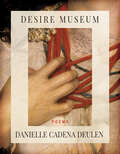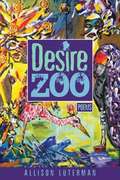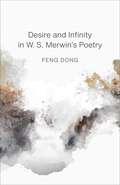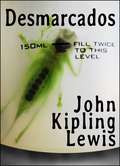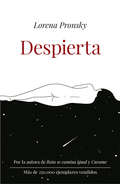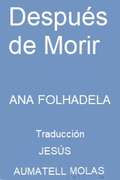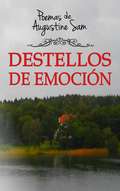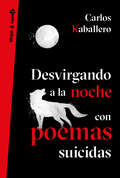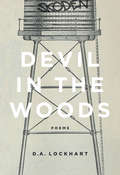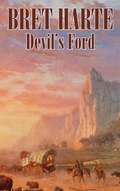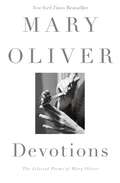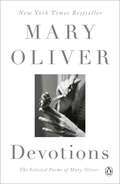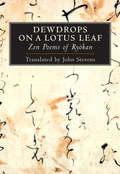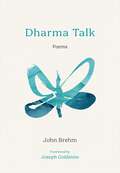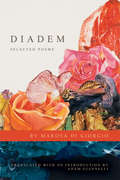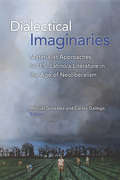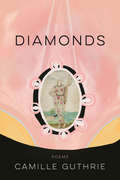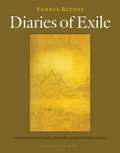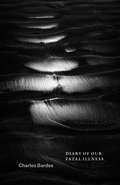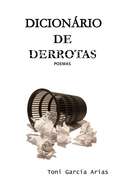- Table View
- List View
Desire Museum
by Danielle Cadena DeulenConsumed with the accumulation of lost time and unfulfilled longing, Desire Museum by Danielle Cadena Deulen is an intricate exploration of things left unfinished or unsatisfied. Divided into four sections and shaped by female-identified embodiment, Desire Museum touches on lost love and friendship, climate crisis, lesbian relationships, and the imprisonment of children at the U.S.-Mexico border. These poems trace the pleasures and pitfalls of sex, the anxieties of motherhood, and the ramifications of interpersonal, sociopolitical, and environmental trauma in women’s lives. In these pages, Deulen holds up a candle to desire itself, questioning what it means to recognize and embrace one's desires, or what it might mean to let them go.In conversation with Hopkins, Keats, Crane, and Lorca, Deulen seamlessly weaves memories into dreamscapes and blurs the human and natural worlds. With love, wonder, grief, and awe, Desire Museum shows us that to live alongside desire is to refuse to be contained: “I refuse meaning [ ] the first sunrise reiterates the last.”
Desire Zoo: Poems
by Alison LutermanAlison Luterman's eye is on women, on children, in the streets and in the woods. Or at home alone in front of a desk. Her arms envelop love in whatever form it shows up: a cup of coffee from her husband, or the curve of a pregnant woman's belly as she walks around the lake in flip-flops. Luterman's poems are concerned with this and more. She is not abstract--she can't stop telling stories. She doesn't know how to refrain from making meaning out of scraps of beauty that she's found. For Luterman, poetry is both a privilege and a job.
Desire and Infinity in W. S. Merwin's Poetry
by Dong FengIn the first monograph on W. S. Merwin to appear since his death in 2019, Feng Dong focuses on the dialectical movement of desire and infinity that ensouls the poet’s entire oeuvre. His analysis foregrounds what Merwin calls “the other side of despair,” the opposite of humans’ articulated personal and social agonies. Feng finds these presences in Merwin’s evocations of what lingers on the edge of constantly updated socio-symbolic frameworks: surreal encounters, spiritual ecstasies, and abyssal freedoms. By examining Merwin’s lifelong engagement with psychic fantasies, anonymous holiness, entities both natural and supernatural, and ghostly ancestors, Feng uncovers a precarious relation with the unarticulated, unrealized side of existence. Drawing on theories from Lacan, Žižek, Levinas, and Heidegger, Desire and Infinity in W. S. Merwin’s Poetry reads a metaphysical possibility into the poet’s work at the intersection between contemporary poetics, philosophy, and psychoanalysis.
Desmarcados
by David Murra Morales John Kipling LewisDesmarcados comprende una serie de microrrelatos y poemas de temas variados que juegan con las expectativas del lector. Nos muestra escenarios insólitos que se mueven entre lo experimental y lo poético: teorías conspirativas, ciencia ficción y cuentos filosóficos son tan sólo algunos de los géneros presentes en esta obra de John Kipling Lewis.
Despierta
by Lorena PronskyEn Despierta Lorena Pronsky nos habla, de una manera honesta y visceral, sobre cómo superar los golpes de la vida: las pérdidas, el desamor y los miedos. La mayoría de las decisiones que tomamos en nuestra vida las hacemos estando dormidos. Casi arrastrados por un estado de inercia. Cuando reaccionamos, el paso ya está dado y el resto del tiempo nos quedamos ahí -atrapados- intentando hacer algo con eso que ni advertimos haber decidido. Hay cosas que no se deshacen. Querer intentarlo es verle la cara a la frustración. Por el contrario, se hace necesario un viaje a nuestro mundo interior. Si registramos lo que hacemos y sentimos, ganamos libertad y la posibilidad urgente de conocer nuestros deseos más profundos. ¿Quién soy? ¿Qué quiero? ¿Cómo lo quiero? Ser conscientes de lo que sentimos: decirlo, palparlo y nombrarlo son formas en las que logramos adueñarnos de nuestra vida. Cuanto antes despertemos a nuestro mundo interior, más sabias y honestas serán nuestras decisiones. Despierta es el paso hacia una existencia verdadera. Una invitación a conocernos y animarnos a pisar firme y fuerte. Siempre hacia donde nos guíen nuestros latidos. Sí. Los nuestros.Lorena Pronsky
Después de morir
by Ana FolhadelaTal i como se nos advierte desde el mismo título, este libro toma a la muerte como motivo central, entendida no como transcendencia, sino como parte indisolciable de la vida mundana. Así, la autora sittúa su discurso en la vía del existencialismo, desarrollando algunos de sus corolários: el absurdo, el desdoblamiento, la disolución de la identidad, la náusea... No renuncia, sin embargo, al lirismo, generalmente comedido, conciso, centrado en conceptos, tales com el río o la niebla, que eleva a símbolos.
Destellos de Emoción
by Augustine Sam Lic. Liliana Ganduglia Traductora literariaDestellos de Emoción- Finalista del International Book Award de 2015- es simultáneamente oportuno & eterno. La selección nos permite aprovechar las ideas del poeta sobre una amplia variedad de temas desde la vida y el amor hasta la muerte y el trabajo forzado. Es poesía contemporánea con una arista sobresaliente, con un estilo dinámico, refrescante e innovador. Un “libro indispensable” para todo el que alguna vez ha experimentado amor, dolor, derrota, o alegría…
Desterratuen piztiarioa
by Asier SerranoDesterrua izan daiteke behartua edo izan daiteke aukeratua. Poemotan azalduko zaizkizun ahotsek hasi dute egunerokotik deserrotuko dituen bidaia bakartia. Bakardade jasangaitzari aurre egiteko, ordea, piztiak asmatu beharko dituzte bidaide modura. Piztia horien oinatza izango da desterratuen zainetan nabigatuko duen mina. Poema bat idazteko nahikoa da norberaren ingurura begiratzen ikastea, baina poema bilduma bat osatzeko norberaren barneko paisaia desterratuak begiratzen ikasi behar da.
Desvirgando a la noche con poemas suicidas
by Carlos KaballeroCarlos Kaballero, el poeta de redes que reformula el realismo sucio con un poemario repleto de crítica social y nocturnidad. Estas páginas están hechas de insomnio. <P><P>Cada una de sus palabras es un trozo de madrugada. Textos escritos en la noche, sobre la noche y para la noche... <P> Porque el amor, la vida, la soledad, el sexo y el mundo se ven de un modo distinto bajo la luz de un flexo en la ciudad callada. Porque la angustia de la falta de sueño transporta a un lugar brumoso en el que se confunde la realidad... <P>O tal vez al contrario, se vea todo demasiado claro. «Tú encárgate de viviry de hacerme vivir contigo,yo me encargaréde dejar todo estopor escrito.»
Devil in the Woods
by D.A. LockhartA collection of letter and prayer poems in which an Indigenous speaker engages with non-Indigenous famous Canadians. D.A. Lockhart’s stunning and subversive fourth collection gives us the words, thoughts, and experiences of an Anishinaabe guy from Central Ontario and the manner in which he interacts with central aspects and icons of settler Canadian culture. Riffing off Richard Hugo’s 31 Letters and 13 Dreams, the work utilizes contemporary Indigenous poetics to carve out space for often ignored voices in dominant Canadian discourse (and in particular for a response to this dominance through the cultural background of an Indigenous person living on land that has been fundamentally changed by settler culture). The letter poems comprise a large portion of this collection and are each addressed to specific key public figures—from Sarah Polley to Pierre Berton, k.d. lang to Robertson Davies, Don Cherry to Emily Carr. The second portion of the pieces are prayer poems, which tenderly illustrate hybrid notions of faith that have developed in contemporary Indigenous societies in response to modern and historical realities of life in Canada. Together, these poems act as a lyric whole to push back against the dominant view of Canadian political and pop-culture history and offer a view of a decolonized nation. Because free double-doubles… tease us like bureaucratic promises of medical coverage and housing not given to black mold and torn- off siding. Oh Lord, let us sing anew, in this pre-dawn light, a chorus that shall not repeat Please Play Again. (from “Roll Up the Rim Prayer”)
Devil's Ford
by Bret HarteTwo young women, the daughters of an engineer who has secretly squandered the family finances in ill-advised mining schemes in Devil's Ford, find themselves romanced by two stockholders, who seek to keep the women ignorant of their father's failure . . . and end up nearly destroying themselves in the process.
Devotions
by Mary OliverA New York Times Bestseller, chosen as Oprah's 'Books That Help Me Through' for Oprah's Book ClubChosen by Poetry Book Society as their special commendation'No matter where one starts reading, Devotions offers much to love, from Oliver's exuberant dog poems to selections from the Pulitzer Prize-winning American Primitive, and Dream Work, one of her exceptional collections. Perhaps more important, the luminous writing provides respite from our crazy world and demonstrates how mindfulness can define and transform a life, moment by moment, poem by poem' The Washington Post'It's as if the poet herself has sidled beside the reader and pointed us to the poems she considers most worthy of deep consideration' Chicago TribuneThroughout her celebrated career, Mary Oliver touched countless readers with her brilliantly crafted verse, expounding on her love for the physical world and the powerful bonds between all living things. Devotions is a stunning, definitive and carefully curated collection featuring work from over fifty years of writing - from Oliver's very first book of poetry, No Voyage and Other Poems, published in 1963 at the age of 28, through to her last collection, Felicity, published in 2015. This timeless volume, arranged by Oliver herself, showcases the beloved poet at her edifying best. Within these pages, she provides us with an extraordinary and invaluable collection of her passionate, perceptive, and much-treasured observations of the natural world.
Devotions: The Selected Poems of Mary Oliver
by Mary OliverPulitzer Prize-winning poet Mary Oliver presents a personal selection of her best work in this definitive collection spanning more than five decades of her esteemed literary career.&“No matter where one starts reading, Devotions offers much to love, from Oliver's exuberant dog poems to selections from the Pulitzer Prize-winning American Primitive, and Dream Work, one of her exceptional collections. Perhaps more important, the luminous writing provides respite from our crazy world and demonstrates how mindfulness can define and transform a life, moment by moment, poem by poem.&” —The Washington Post&“It&’s as if the poet herself has sidled beside the reader and pointed us to the poems she considers most worthy of deep consideration.&” —Chicago TribuneThroughout her celebrated career, Mary Oliver has touched countless readers with her brilliantly crafted verse, expounding on her love for the physical world and the powerful bonds between all living things. Identified as "far and away, this country's best selling poet" by Dwight Garner, she now returns with a stunning and definitive collection of her writing from the last fifty years.Carefully curated, these 200 plus poems feature Oliver's work from her very first book of poetry, No Voyage and Other Poems, published in 1963 at the age of 28, through her most recent collection, Felicity, published in 2015. This timeless volume, arranged by Oliver herself, showcases the beloved poet at her edifying best. Within these pages, she provides us with an extraordinary and invaluable collection of her passionate, perceptive, and much-treasured observations of the natural world.
Dew On Petals
by Board Of EditorsThis is a collection of poems by different poets. Each poet is introduced with a detailed biographical sketch and every poem is followed with the theme and a detailed glossary and explanation.
Dewdrops on a Lotus Leaf: Zen Poems of Ryokan
by John StevensThe Japanese poet-recluse Ryokan (1758-1831) is one of the most beloved figures of Asian literature, renowned for his beautiful verse, exquisite calligraphy, and eccentric character. Deceptively simple, Ryokan's poems transcend artifice, presenting spontaneous expressions of pure Zen spirit. Like his contemporary Thoreau, Ryokan celebrates nature and the natural life, but his poems touch the whole range of human experience: joy and sadness, pleasure and pain, enlightenment and illusion, love and loneliness. This collection of translations reflects the full spectrum of Ryokan's spiritual and poetic vision, including Japanese haiku, longer folk songs, and Chinese-style verse. Fifteen ink paintings by Koshi no Sengai (1895-1958) complement these translations and beautifully depict the spirit of this famous poet.
Dharma Talk: Poems
by John BrehmA new volume of original poetry from the bestselling creator of Poetry of Impermanence, Mindfulness, and Joy.In Dharma Talk, award-winning poet John Brehm explores the perennial themes of aging, compassion, emptiness, nonseparation, and more. At once poignant and humorous, Brehm&’s gentle, wry poems remind us that the personal and the universal are not different—and point us to the Dharma of everyday life.
Dhingamasti
by Suresh Dalalસુરેશ દલાલનાં આ બાળકાવ્યોમાં ધિંગડમલ બાળક પંખીના સૂરનાં પગલાં વીણતું, ફૂલ-સુગંધની પ્યાલી પીતું, વહેતા ઝરણમાં ન્હાતું જાદુઈલકડીથી મનમાન્યાં રૂપ ધરતું અને મોટેરાંની છબી પણ ઉતારતું ધમાચકડી મચાવે છે.
Dhisum Dhisum
by Suresh Dalalબાળક એટલે વિસ્મયની દુનિયાનો વિષ્ણુભગવાન. એની સૃષ્ટિમાં પૂર્ણવિરામનું મહત્ત્વ નથી, પણ આશ્ચર્યચિહ્નોનું સામ્રાજ્ય છે. તમે જો એની દુનિયા તરફ જુઓ તો બાળકાવ્યો કે બાળવાર્તાની ગંગોત્રી શોધવા માટે બહુ દૂર નહીં જવું પડે. ફરિયાદ તો એના હોઠ પર હોય જ. સુરેશ દલાલે એમની આગવી શૈલીમાં બાળકાવ્ય સંગ્રહોમાં રજૂ કર્યા છે.
Dhoop Aur Dhua
by Ramdhari Singh DinkarThe poem is based on the rule of Britishers in India. The poem indicates the state of mind of people in the period when India had just got independence.
Diadem: Selected Poems (Lannan Translations Selection Series)
by Marosa di GiorgioMarosa di Giorgio has one of the most distinct and recognizable voices in Latin American poetry. Her surreal and fable-like prose poems invite comparison to Franz Kafka, Julio Cortázar, or even contemporary American poets Russell Edson and Charles Simic. But di Giorgio's voice, imagery, and themes—childhood, the Uruguayan countryside, a perception of the sacred—are her own. Previously written off as "the mad woman of Uruguayan letters," di Giorgio's reputation has blossomed in recent years. Translator Adam Giannelli's careful selection of poems spans the enormous output of di Giorgio's career to help further introduce English-language readers to this vibrant and original voice. Marosa di Giorgio was born in Salto, Uruguay, in 1932. Her first book Poemas was published in 1953. Also a theater actress, she moved to Montevideo in 1978, where she lived until her death in 2004.
Dialectical Imaginaries: Materialist Approaches to U.S. Latino/a Literature in the Age of Neoliberalism (Class : Culture)
by Carlos Gallego Marcial GonzalezDialectical Imaginaries brings together essays that analyze the effects of class conflict and capitalist ideology on contemporary works of U.S. Latino/a literature. The editors argue that recent global events have compelled contemporary scholars to reexamine traditional interpretive models that center on identity politics and an ethics of multiculturalism. The volume seeks to demonstrate that materialist methodologies have a greater critical reach than other methods, and that Latino/a literary criticism should be more attuned to interpretive approaches that draw on Marxism and other globalizing social theories. The contributors analyze a wide range of literary works in fiction, poetry, drama, and memoir by writers including Rudolfo Anaya, Gloria Anzaldúa, Daniel Borzutzky, Angie Cruz, Sergio de la Pava, Mónica de la Torre, Sergio Elizondo, Juan Felipe Herrera, Rolando Hinojosa, Quiara Alegría Hudes, Lin-Manuel Miranda, Óscar Martínez, Cherríe Moraga, Urayoán Noel, Emma Pérez, Pedro Pietri, Miguel Piñero, Ernesto Quiñónez, Ronald Ruiz, Hector Tobar, Rodrigo Toscano, Alfredo Véa, Helena María Viramontes, and others.
Diamonds (American Poets Continuum Series #189)
by Camille GuthrieDiamonds presents a woman in midlife on the edge. In hilarious and heartbreaking poems, Camille Guthrie writes about the trials and surprises of divorce, parenting, country life—and the difficulties and delights of being alone, looking at art, and falling in love. Witty resilience abounds in these irreverent poems about grief and desire—in which the poet meditates upon gender roles, history, pop culture, and academia. Guthrie subverts and teases traditional forms in an elegy about Sylvia Plath’s prom dress, a dating profile for Hieronymus Bosch, a sestina about beauty and power—with radical dramatic monologues in the voices of Madame du Barry, a Pict Woman, and more. Unlike Virgil, who refuses to guide this poet through her journey at midlife, Guthrie leads readers by the hand into a provoking, affecting journey of a break-up and a reconciliation with love.
Diaries of Exile
by Edmund Keeley Karen Emmerich Yannis RitsosYannis Ritsos is a poet whose writing life is entwined with the contemporary history of his homeland. Nowhere is this more apparent than in this volume, which presents a series of three diaries in poetry that Ritsos wrote between 1948 and 1950, during and just after the Greek Civil War, while a political prisoner first on the island of Limnos and then at the infamous camp on Makronisos. Even in this darkest of times, Ritsos dedicated his days to poetry, trusting in writing and in art as collective endeavors capable of resisting oppression and bringing people together across distance and time. These poems offer glimpses into the daily routines of life in exile, the quiet violence Ritsos and his fellow prisoners endured, the fluctuations in the prisoners' sense of solidarity, and their struggle to maintain humanity through language. This moving volume justifies Ritsos's reputation as one of the truly important poets in Greece's modern literary history.
Diary of Our Fatal Illness (Phoenix Poets Ser.)
by Charles BardesThis moving prose poem tells the story of an aged man who suffers a prolonged and ultimately fatal illness. From initial diagnosis to remission to relapse to death, the experience is narrated by the man’s son, a practicing doctor. Charles Bardes, a physician and poet, draws on years of experience with patients and sickness to construct a narrative that links myth, diverse metamorphoses, and the modern mechanics of death. We stand with the doctors, the family, and, above all, a sick man and his disease as their voices are artfully crafted into a new and powerful language of illness.
Dicionário de derrotas
by Toni Arias"Dicionário de derrotas" é o segundo livro de poemas de Toni García Arias. Neste poema o autor aborda os temas clássicos do mundo poético: a perda da infância e da juventude, o amor, o desamor, as lembranças, a poesia e o passar do tempo. O livro representa como um dicionário, já que os poemas aparecem ordenados alfabeticamente: Ausência, Beijos, Corpo, Distância, etc.
